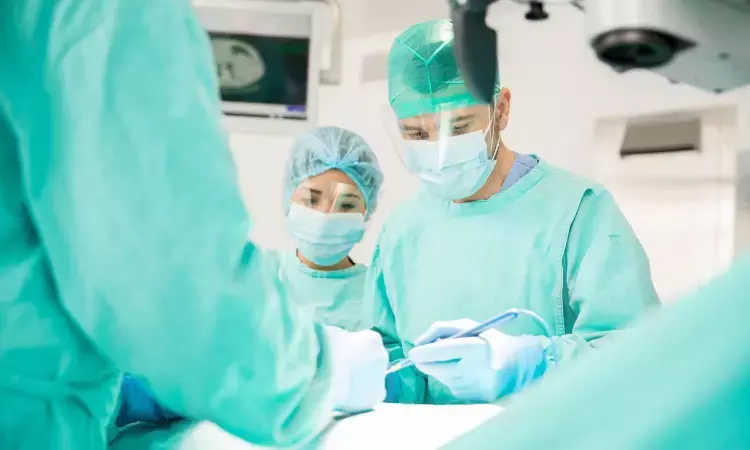- Home
- Medical news & Guidelines
- Anesthesiology
- Cardiology and CTVS
- Critical Care
- Dentistry
- Dermatology
- Diabetes and Endocrinology
- ENT
- Gastroenterology
- Medicine
- Nephrology
- Neurology
- Obstretics-Gynaecology
- Oncology
- Ophthalmology
- Orthopaedics
- Pediatrics-Neonatology
- Psychiatry
- Pulmonology
- Radiology
- Surgery
- Urology
- Laboratory Medicine
- Diet
- Nursing
- Paramedical
- Physiotherapy
- Health news
- Fact Check
- Bone Health Fact Check
- Brain Health Fact Check
- Cancer Related Fact Check
- Child Care Fact Check
- Dental and oral health fact check
- Diabetes and metabolic health fact check
- Diet and Nutrition Fact Check
- Eye and ENT Care Fact Check
- Fitness fact check
- Gut health fact check
- Heart health fact check
- Kidney health fact check
- Medical education fact check
- Men's health fact check
- Respiratory fact check
- Skin and hair care fact check
- Vaccine and Immunization fact check
- Women's health fact check
- AYUSH
- State News
- Andaman and Nicobar Islands
- Andhra Pradesh
- Arunachal Pradesh
- Assam
- Bihar
- Chandigarh
- Chattisgarh
- Dadra and Nagar Haveli
- Daman and Diu
- Delhi
- Goa
- Gujarat
- Haryana
- Himachal Pradesh
- Jammu & Kashmir
- Jharkhand
- Karnataka
- Kerala
- Ladakh
- Lakshadweep
- Madhya Pradesh
- Maharashtra
- Manipur
- Meghalaya
- Mizoram
- Nagaland
- Odisha
- Puducherry
- Punjab
- Rajasthan
- Sikkim
- Tamil Nadu
- Telangana
- Tripura
- Uttar Pradesh
- Uttrakhand
- West Bengal
- Medical Education
- Industry
Excellent long-term survival in real-world patients undergoing SAVR, confirms Study

USA: Results from a national study confirm excellent long-term survival following surgical aortic valve replacement (SAVR), at 92.9% at five years among real-world patients.
The findings from the Society of Thoracic Surgeons (STS) Adult Cardiac Surgery database, published in The Annals of Thoracic Surgery, should set a “benchmark” for soon-to-be-released clinical trial data on transcatheter procedures, according to the authors.
TAVR (transcatheter aortic valve replacement) use for severe aortic stenosis in low-risk patients necessitates evaluating contemporary long-term, real-world outcomes of similar patients undergoing SAVR in a national cohort. Therefore, Vinod H. Thourani, Department of Cardiothoracic Surgery, Piedmont Healthcare, Atlanta, GA, and colleagues included 42,586 patients (mean age 74.3 years; 44.2% women) undergoing primary isolated SAVR at one of 981 hospitals in the STS database between July 2011 and March 2019. Patients were included if they met inclusion and exclusion criteria for PARTNER 3 and Evolut Low Risk, and the mean overall STS PROM score was 1.9%.
Patients were further stratified by STS-predicted risk of mortality (PROM), age, and left ventricular ejection fraction (LVEF). The primary end-point of the study was determined as all-cause National Death Index mortality. Unadjusted survival to 8 years was estimated using the Kaplan–Meier method.
The researchers reported the following findings:
- The overall Kaplan-Meier time-to-event analysis for all-cause mortality at 1-, 3-, 5-, and 8 years was 2.6%, 4.5%, 7.1% and 12.4%, respectively.
- In subset analyses, survival was significantly better for 1) lower STS PROM, 2) younger versus older age, and 3) higher versus lower LVEF.
- When STS PROM was below 1% or the patient age was below age 75 years, the 8-year survival following SAVR was 95%.
"Findings of this national study confirm that the long-term survival following SAVR remains excellent, at 92.9% at 5 years," the researchers wrote.
These contemporary longitudinal data serve to aid in the balanced interpretation of current and future trials comparing SAVR and TAVR and may assist in the clinical decision-making process for patients of lower surgical risk," they concluded.
Reference:
Thourani, V. H., Habib, R., Szeto, W. Y., Sabik, J. F., Romano, J. C., MacGillivray, T. E., & Badhwar, V. (2023). Survival Following Surgical Aortic Valve Replacement in Low-Risk Patients: A Contemporary Trial Benchmark. The Annals of Thoracic Surgery. https://doi.org/10.1016/j.athoracsur.2023.10.006
Dr Kamal Kant Kohli-MBBS, DTCD- a chest specialist with more than 30 years of practice and a flair for writing clinical articles, Dr Kamal Kant Kohli joined Medical Dialogues as a Chief Editor of Medical News. Besides writing articles, as an editor, he proofreads and verifies all the medical content published on Medical Dialogues including those coming from journals, studies,medical conferences,guidelines etc. Email: drkohli@medicaldialogues.in. Contact no. 011-43720751


